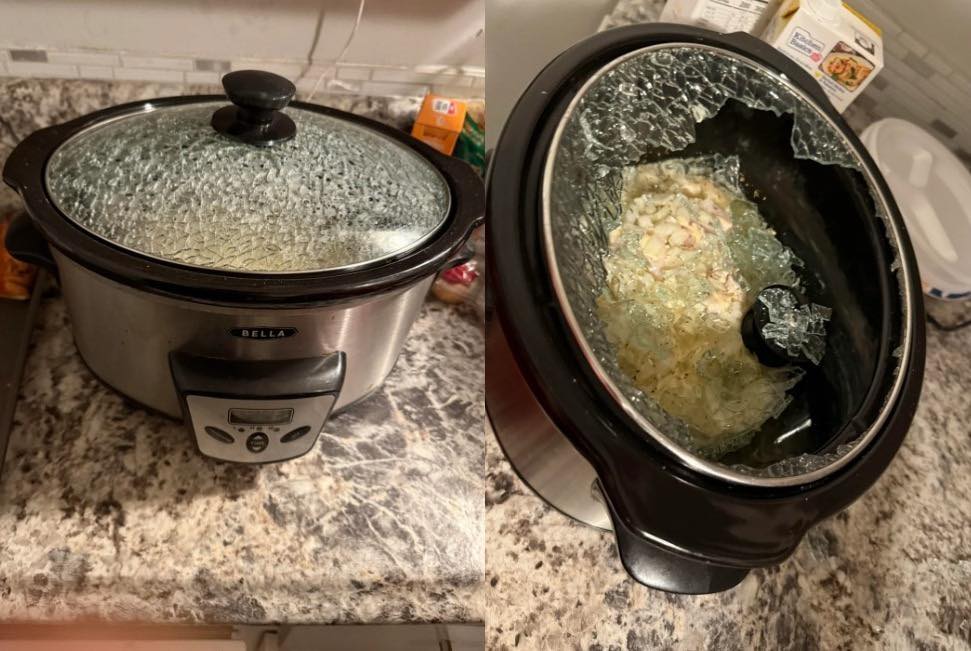ADVERTISEMENT
Slow cookers are a game-changer for easy, hands-off meals, but not every ingredient thrives under their low, steady heat. Some foods turn out mushy, rubbery, or even unsafe when cooked this way. To save your meals from disaster, here are 11 foods to avoid putting in your slow cooker—plus smart swaps to make your recipes work.
ADVERTISEMENT
1. Dairy (Milk, Cream, Cheese)
Why? Dairy curdles and separates under prolonged heat, ruining creamy dishes.
What happens? Cheese turns grainy, milk splits, and sauces become watery.
Fix: Stir in dairy during the last 30 minutes of cooking. For cheese sauces, use processed cheese (like Velveeta) for smoother melting.
2. Seafood (Shrimp, Fish, Scallops)
Why? Delicate seafood overcooks quickly, turning rubbery.
What happens? Shrimp shrinks, fish falls apart, and scallops lose their tenderness.
Fix: Add seafood only in the last 30-60 minutes to keep it tender.
3. Fresh Herbs (Basil, Cilantro, Parsley)
Why? Their bright flavors fade or turn bitter with long cooking.
What happens? Herbs lose freshness and taste dull or harsh.
Fix: Use dried herbs while cooking, then garnish with fresh herbs at the end.
4. Alcohol (Wine, Beer, Liquor)
Why? Alcohol doesn’t evaporate well in a slow cooker, leaving a harsh taste.
What happens? Dishes taste overly boozy instead of rich and balanced.
Fix: Cook alcohol on the stovetop first to reduce it, then add to the slow cooker.
5. Lean Meats (Chicken Breast, Pork Tenderloin)
Why? Without enough fat or liquid, they dry out.
What happens? Meat turns tough, stringy, and flavorless.
Fix: Use fattier cuts (chicken thighs, chuck roast) or add extra broth.
6. Pasta
Why? It absorbs too much liquid and turns mushy.
What happens? Noodles disintegrate into a gummy mess.
Fix: Cook pasta separately and mix it in just before serving.
7. Rice
Why? White rice overcooks, while brown rice stays undercooked.
What happens? Rice becomes gluey or stays crunchy.
Fix: Cook rice separately or use instant rice (added late in cooking).
8. Dry Beans (Kidney, Black Beans)
Why? Raw beans contain toxins that slow cookers may not neutralize.
What happens? Undercooked beans can cause food poisoning.
Fix: Soak and boil beans before slow cooking, or use canned beans.
9. Delicate Veggies (Spinach, Zucchini, Peas)
Why? They turn mushy and lose flavor.
What happens? Spinach disappears, zucchini gets watery.
Fix: Add them in the last 30 minutes to keep texture intact.
ADVERTISEMENT
10. Whole Eggs
Why? They cook unevenly and turn rubbery.
What happens? Hard-boiled eggs get tough; scrambled eggs turn spongy.
Fix: Cook eggs separately and add them later.
11. Crispy Ingredients (Bacon, Breadcrumbs, Fried Onions)
Why? Slow cookers trap steam, making crispy foods soggy.
What happens? Bacon turns limp, toppings lose crunch.
Fix: Add crispy elements right before serving.
Final Tip:
If a recipe includes these ingredients, adjust when you add them—often at the end of cooking. This keeps textures and flavors perfect while still using your slow cooker’s convenience.
Want creamy, crispy, or tender results? Plan ahead and your slow cooker meals will turn out amazing every time! 🍲🔥
ADVERTISEMENT
ADVERTISEMENT
